

15 eLearning Questions to Ask Your Subject Matter Experts. Content-Focusing Questions for SME Interviews. Once we have established the business need and learning objectives for a project, our next big task is to gather the content.
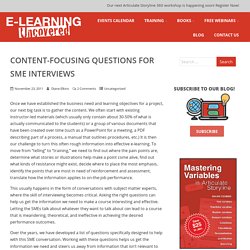
We often start with existing instructor-led materials (which usually only contain about 30-50% of what is actually communicated to the students) or a group of various documents that have been created over time (such as a PowerPoint for a meeting, a PDF describing part of a process, a manual that outlines procedures, etc.) It is then our challenge to turn this often rough information into effective e-learning.
To move from “telling” to “training,” we need to find out where the pain points are, determine what stories or illustrations help make a point come alive, find out what kinds of resistance might exist, decide where to place the most emphasis, identify the points that are most in need of reinforcement and assessment, translate how the information applies to on-the-job performance. What are some of the areas that cause the most confusion? EmailSMEMeetingTemplate. 15 eLearning Questions to Ask Your Subject Matter Experts.
Content-Focusing Questions for SME Interviews. 7 Tips for Engaging Subject Matter Experts with an eLearning Project. Hello@growthengineering.co.uk Search Close Menu 7 Tips for Engaging Subject Matter Experts August 19, 2015 Engagement Share on facebook Share on twitter Share on linkedin Share on email To help instructional designers and subject matter experts create a great piece of learning content, here are 10 top tips to getting the most out of your subject matter experts.
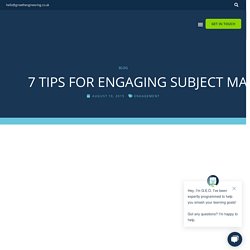
Contrary to rumour, SMEs aren’t corporate fossils who refuse to understand or accept the point of eLearning. They are extraordinarily busy people who already have a lot to do, and the chances are that the eLearning project is yet another task on their already-full schedule. It’s important for instructional designers to take a step back, appreciate the SME’s challenges and try to accommodate them as much as possible.
The work of an instructional designer is never done, so once you’ve finished one big training course your eyes will be set firmly on the next one. Read up as much as you can beforehand so that you can hit the ground running. How to Get The Most Out Of Your Subject Matter Experts. In previous posts, we explored understanding the customer’s perspective, how to jump start you project, what you should know about designing a course, and how to build a project plan.
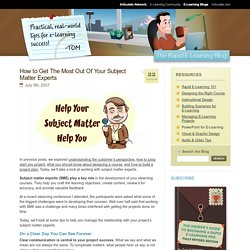
Today, we’ll take a look at working with subject matter experts. Subject matter experts (SME) play a key role in the development of your elearning courses. They help you craft the learning objectives, create content, review it for accuracy, and provide valuable feedback. At a recent elearning conference I attended, the participants were asked what some of the biggest challenges were to developing their courses. Well over half said that working with SME was a challenge and many times interfered with getting the projects done on time. Working With Subject Matter Experts: The Ultimate Guide. 5 experts share ideas on how to work effectively with SMEs - Elucidat. 3 Most Common Types of SMEs and How to Deal with Them.
How to Overcome the Challenge of Working with Subject Matter Experts. A large part of your success hinges on the relationship you have with the course’s subject matter experts.
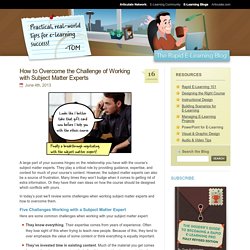
They play a critical role by providing guidance, expertise, and context for much of your course’s content. However, the subject matter experts can also be a source of frustration. Many times they won’t budge when it comes to getting rid of extra information. Or they have their own ideas on how the course should be designed which conflicts with yours. How to Work with Difficult Subject-Matter Experts. If I were a SME, what kind of SME would I be?
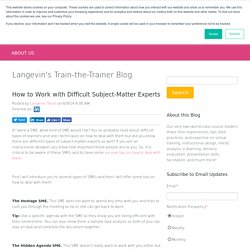
You’ve probably read about difficult types of learners and seen techniques on how to deal with them but did you know there are different types of subject-matter experts as well? 6 Tips for Working with your Subject Matter Expert. When it comes to developing great curriculum for the humans in your organization, finding the right subject matter expert (SME) can mean the difference between elegant content simplicity or complexity in motion.

We can all accept that design simplicity is critical to the exchange of knowledge. As workplace educators, our job is help people succeed in the workplace. Our SME has a different role. Their role is to have complete knowledge of the topic. Their knowledge helps the organization perform at level best. Now enter the big question. First and foremost, before getting to the 6 tips, try to imagine how the SMEs think about the world around them and their role within the organization.
Keeping this point of view in mind, here are 6 Tips to help you build your relationship with your SME. Active Listening Developing your active listening skills will help you in all areas in your life and not only working effectively with SMEs. Avoid Assumptions Remove Communication Barriers Set Expectations. ID Webcomic #1 – Working with SMEs on Content. (You can make them sit through it, but you can’t make them pick it up and carry it around…)
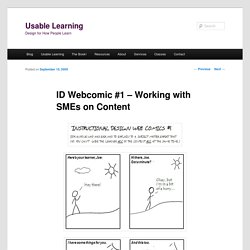
Is It Necessary For An Instructional Designer To Be A Subject Matter Expert? Formative Evaluations: 4 Types of Feedback. SME Meetings: Productive or Frustrating? Subject Matter Expert. How to Get The Most Out Of Your Subject Matter Experts.